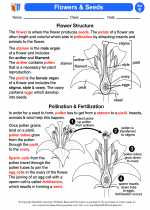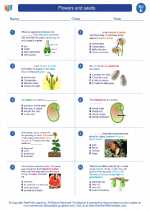Flowers and seeds -> molecular biology
Molecular Biology
Molecular biology is a branch of biology that focuses on the study of the structure and function of biological macromolecules at the molecular level. It involves the study of DNA, RNA, proteins, and other biomolecules to understand the processes that occur within living organisms.
Key Concepts in Molecular Biology
- DNA Structure and Function: DNA is the genetic material that carries hereditary information in living organisms. It is composed of nucleotides and forms a double helix structure. The function of DNA is to store and transmit genetic information.
- RNA and Protein Synthesis: RNA is involved in the synthesis of proteins through a process called transcription and translation. These processes take place in the cell's nucleus and cytoplasm, respectively.
- Genetic Mutations: Mutations in DNA can lead to changes in the genetic code, which can affect the structure and function of proteins, and ultimately impact the phenotype of an organism.
- Gene Expression: Gene expression refers to the process by which information from a gene is used to synthesize a functional gene product, such as a protein.
- Recombinant DNA Technology: This involves the manipulation of DNA to produce new combinations of genetic material, leading to the development of genetically modified organisms and biotechnology applications.
Study Guide for Molecular Biology
To master the concepts of molecular biology, it is important to focus on the following key areas:
- Understand the structure of DNA, including the role of nucleotides, the double helix structure, and the complementary base pairing.
- Learn the process of DNA replication and the enzymes involved in this process.
- Study the process of transcription and translation, and how RNA is synthesized and used to produce proteins.
- Explore the different types of genetic mutations and their potential impacts on organisms.
- Understand the regulation of gene expression and the factors that influence the level of gene activity.
- Learn about the applications of recombinant DNA technology in various fields, such as medicine, agriculture, and industry.
- Practice solving problems related to molecular biology, such as analyzing DNA sequences and predicting the effects of mutations.
By mastering these key areas and practicing problem-solving, you can develop a strong understanding of molecular biology and its significance in the field of biology and biotechnology.
[Molecular Biology] Related Worksheets and Study Guides:
.◂Science Worksheets and Study Guides Fifth Grade. Flowers and seeds
Study Guide Flowers and seeds
Flowers and seeds  Activity Lesson
Activity Lesson Flowers & Seeds
Flowers & Seeds  Worksheet/Answer key
Worksheet/Answer key Flowers and seeds
Flowers and seeds  Worksheet/Answer key
Worksheet/Answer key Flowers and seeds
Flowers and seeds  Worksheet/Answer key
Worksheet/Answer key Flowers and seeds
Flowers and seeds  Worksheet/Answer key
Worksheet/Answer key Flowers and seeds
Flowers and seeds  Vocabulary/Answer key
Vocabulary/Answer key Flowers and seeds
Flowers and seeds  Vocabulary/Answer key
Vocabulary/Answer key Flowers and seeds
Flowers and seeds 

 Activity Lesson
Activity Lesson
 Worksheet/Answer key
Worksheet/Answer key
 Worksheet/Answer key
Worksheet/Answer key
 Worksheet/Answer key
Worksheet/Answer key
 Worksheet/Answer key
Worksheet/Answer key
 Vocabulary/Answer key
Vocabulary/Answer key
 Vocabulary/Answer key
Vocabulary/Answer key

The resources above cover the following skills:
Life Science
All organisms have structures and systems with separate functions. Students can:
Develop and communicate an evidence-based scientific explanation of the role of different organs or structures that are important for an organism's survival - in both plants and animals